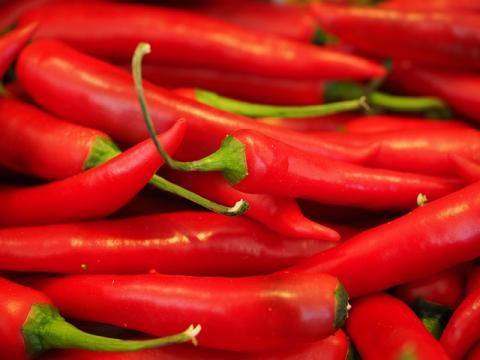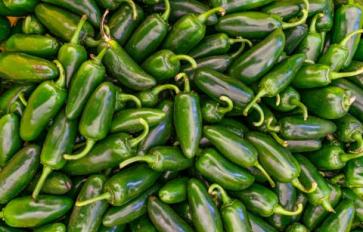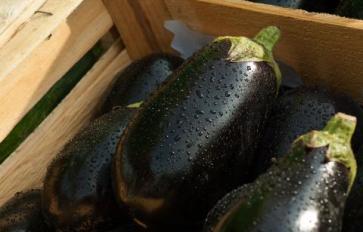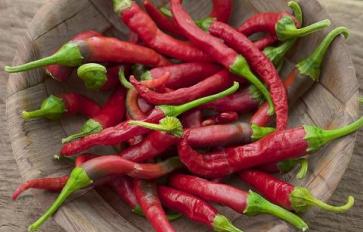
No fruit represents passion more than chili peppers. Not only are they spicy to the lips, their bright red and green colors are a feast for the eyes. Just thinking about them can make a person sweat in anticipation. Throw them on a frying pan and hear them sizzle while they reflect glistening shards of deliciousness. Would you be surprised to hear that chili peppers have many health benefits for people? Yes, chili peppers should make your mouth water for more than one reason…
Killing Bacteria and Preventing Them From Invading Cells
Bacteria called Streptococcus pyogenes, also known as Group A streptococci (GAS), infect and harm humans. These smart little critters are able to avoid antibiotics by invading a human cell and hiding inside of it. Well, chili peppers contain a chemical called capsaicin, which turns out to work magnificently against GAS. Not only does capsaicin cause these bacteria to die at lethal doses, when the dose is not high enough to kill, capsaicin still affects the bacteria. Capsaicin makes the bacteria less able to invade human cells, even making highly invasive strains no longer invasive. This is great because capsaicin prevents these bacteria from burrowing into human cells and hiding, which makes them vulnerable to other treatments that have traditionally not worked.
Protecting Cells Against X-Rays
X-rays are high energy waves that come from space radiation, radioactive material, and X-ray machines used in medical clinics. They are dangerous to humans because they cause breaks in the DNA, like a high-energy canon ball that rips through the cell. Too much exposure to X-rays and we get cancer. Researchers studied the ability of chemicals from chili peppers to protect human white blood cells from X-ray damage. The chemicals were able to reduce the amount of death caused by X-rays by 50%. This means that half of the cells that normally would have died were able to survive. In case you were wondering, the names of these chemicals were left to the end of this section. Otherwise, they might have distracted you by making you wonder why trying to pronounce their name doesn’t cause cancer. The chili chemicals are called sinapoyl-E-glucoside, quercetin-3-O-rhamnoside-7-O-glucoside, quercetin-3-O-rhamnoside and luteolin-7-O-(2-apiosyl)-glucoside. (I told you so…)
Reducing the Risk of Stomach Cancer
A group of scientists examined 10 published articles about the benefits of capsaicin, a chemical inside of chili peppers, against stomach cancer. By pooling the number of patients in each of the 10 studies, their hope was to get something similar to one large study. Using statistics, they were able to find that eating low levels of chili peppers protected people from stomach cancer more than if they had eaten high levels of chili peppers. This “low-is-good, high-is-not-useful” effect of chili peppers was true for Korean populations and Mexican populations.
Stopping the Spread of Breast Cancer
Breast cancer kills by spreading to other parts of the body and destroying those organs. However, the chemicals in chili pepper seeds are able to put a stop to this deadly spread. The chemicals from chili pepper seeds in this study contained only molecules called phenols, not the capsaicin that is known to protect human health. However, not to be outdone by the better known disease-fighting chemicals, the phenols were able to slow the crawling movement of ER-positive breast cancer cells, while also slowing the crawling movement of the more aggressive, ER-negative breast cancer cells. The phenols from chili pepper seeds caused the breast cancer cells to secrete fewer enzymes that digest the path required for the cells to crawl. Also, the phenols caused ER-positive breast cancer cells to form attachments to each other, which makes it harder for single cells to crawl around.
References
Marini et al. “Antimicrobial and Anti-Virulence Activity of Capsaicin Against Erythromycin-Resistant, Cell-Invasive Group A Streptococci.” Frontiers in Microbiology. 2015, 6:1281.
Materska et al. “Antioxidant activity and protective effects against oxidative damage of human cells induced by X-radiation of phenolic glycosides isolated from pepper fruits Capsicum annuum L.” Food Chemistry. 2015, 168:546-53.
Pabalan et al. “The impact of capsaicin intake on risk of developing gastric cancers: a meta-analysis.” Journal of Gastrointestinal Cancer. 2014, 45(3):334-41.
Kim et al. “Pepper seed extract suppresses invasion and migration of human breast cancer cells.” Nutrition and Cancer. 2014, 66(1):159-65.





